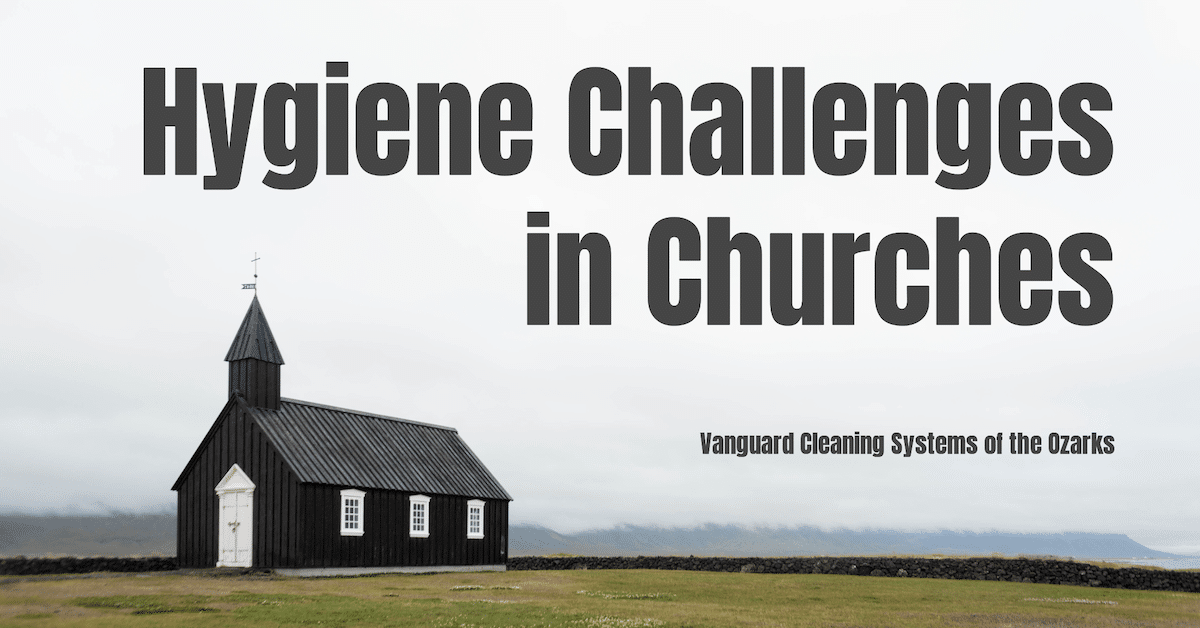Churches face various health, safety, and hygiene challenges that can be mitigated almost entirely through enhanced managed custodial services.

The Susceptibility of Churches to Germ Transmission
Churches are often crowded spaces where people gather closely together.
This can make it easier for germs to spread from person to person through respiratory droplets produced when an infected person coughs or sneezes.
Additionally, churches often have shared surfaces people touch frequently, such as pews, doorknobs, and hymnals.
These surfaces can become contaminated with germs if an infected person touches them and then someone else touches them without washing their hands.
Finally, churches may have people with weakened immune systems, such as the elderly or those with chronic health conditions, making them more susceptible to infection. [1]
Primary Health and Hygiene Concerns Impacting Churches
The primary health, hygiene, and safety concerns that can impact churches include:
- Allergens - Churches may have members with allergies to certain substances, such as pollen, dust, or specific food items. Proper cleaning and maintenance to minimize allergens help create a safer environment for those affected.
- Fomites - Heavily trafficked churches have a significant number of high-contact surfaces that play host to numerous illness-causing germs and bacteria. Fomites should be cleaned and disinfected several times per day during occupied periods.
- Airborne pathogens - Viruses like the common cold or influenza spread rapidly in close quarters, underscoring the importance of high indoor air quality levels.
- Indoor air quality - Ensuring good indoor air quality is vital for the well-being of church attendees. Proper ventilation, regular maintenance of HVAC systems, and reducing the use of harmful substances, such as cleaning chemicals with strong odors, can help maintain a healthy environment.
- Slip, trip, and fall hazards - Churches often have large gathering spaces and various amenities, such as stairs, ramps, and seating areas. Identifying and addressing potential slip, trip, and fall hazards, such as uneven flooring, inadequate lighting, or cluttered areas, is crucial to prevent accidents and injuries.
- Food safety - Churches that offer communal meals or events involving food should follow proper food handling and storage practices to prevent foodborne illnesses. This includes maintaining safe temperatures, good hygiene among food handlers, and appropriate storage and disposal of perishable items.
Germ Prevention Methods
The best methods for reducing the risk of germ transmission in churches include:
- Washing your hands often - This is the most critical thing you can do to prevent the spread of germs. Wash your hands with soap and water for at least 20 seconds, especially before and after touching shared surfaces, after using the restroom, and after blowing your nose, coughing, or sneezing.
- Providing hand sanitizer - If soap and water are not available, hand sanitizer is a good option. Look for hand sanitizer that contains at least 60% alcohol.
- Cleaning and disinfecting shared surfaces regularly - This includes things like pews, doorknobs, hymnals, and other surfaces that people touch frequently. Use a disinfectant that is effective against germs.
- Staggering services or offering online streaming options to reduce crowding - This will help reduce the number of people in close contact with each other.
- Providing masks for people who are sick or who have weakened immune systems - Masks can help to prevent the spread of germs from person to person. [2]
References
- Why are places of worship connected to multiple COVID-19 outbreaks? (2020, July 30). TODAY.com. https://www.today.com/health/why-are-places-worship-so-susceptible-covid-19-outbreaks-t188095
- CDC. (2022, November 2). Cleaning and Disinfecting Your Facility. Centers for Disease Control and Prevention. https://www.cdc.gov/hygiene/cleaning/facility.html
Takeaway
The susceptibility of churches to germ transmission is a serious concern.
However, by following basic safety and hygiene best practices, churches can help reduce the risk of germ transmission and ensure congregation safety.
In addition to the above, churches should also consider outsourcing their custodial needs to a professional cleaning company.
This ensures the church's facilities are cleaned and disinfected correctly, using effective disinfectants and procedures.
Outsourcing custodial services can also free up the church's staff to focus on other tasks, such as ministry and outreach.
Outsourcing is a proven method for onboarding skilled service providers equipped with the latest training, processes, and technologies for a fraction of the price of maintaining a comparable service in-house.
Contact us today and discover why Vanguard Cleaning Systems® is the Standard of Clean® for businesses throughout Northwest Arkansas, Missouri, and Oklahoma.
In Oklahoma, dial 918-960-4450
In Arkansas, dial 479-717-2410
In Missouri, dial 417-812-9777
